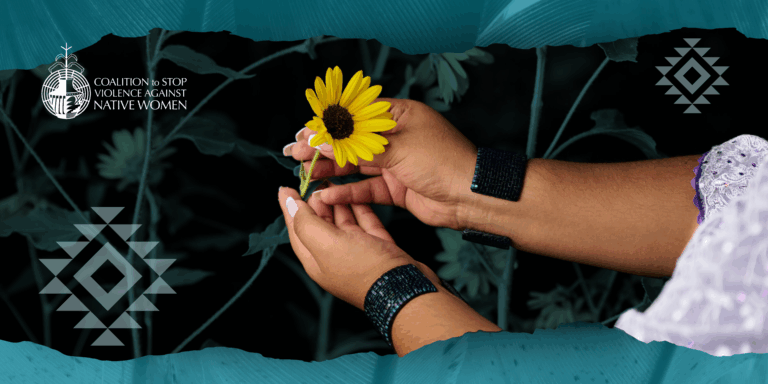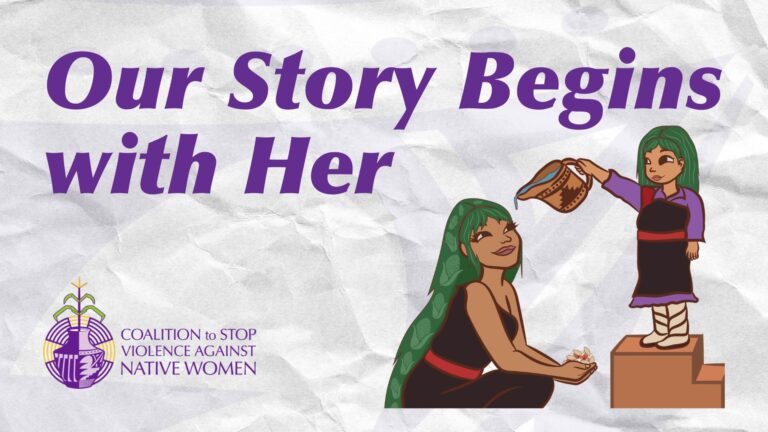February is Teen Dating Violence Awareness Month (TDVAM), a month-long campaign dedicated to raising awareness about teen dating abuse and educating youth on healthy relationships to break the cycle of violence in our communities. At CSVANW, we strongly believe that our Native youth carry the hopes, visions, prayers, songs of their ancestors, and most importantly, the resilience of their families and their communities. We honor our Native youth, as the future leaders of our communities and as vital contributors to mobilizing strength-based solutions to the challenges our communities face today. We empower Native youth and their caregivers to break the cycles of violence and offer the opportunity to lead this work alongside us.
Teen dating violence is a type of violence that happens between two young people in a relationship. The harmful and aggressive behaviors can be shown as physical, emotional, sexual, or technological abuse. “Teen dating violence profoundly impacts lifelong health, [safety], opportunity, and wellbeing. Unhealthy relationships can start early and last a lifetime. The good news is violence is preventable, and we can all help young people grow up violence-free” (Source, cdc.gov). According to a report by the U.S. Attorney General’s office release on November 18, 2014, violence, including intentional injuries, homicide and suicide, account for 75% of Native youth deaths. Protecting our youth is our priority and there are many ways we can keep our youth safe while dating.[/vc_column_text][vc_column_text]
10 Tips for Teen Dating Safety for Caregiver(s):
- Teach your teen what the warning signs are of an abusive relationship (Examples: Checking your phone without permission, constantly putting you down, extreme jealousy or insecurity, explosive temper, and isolating you from family or friends).
- Demonstrate and teach what is essential for a healthy relationship (Examples: Modeling healthy community response and conflict resolutions in a relationship).
- Discourage online dating by discussing the risks of online dating relationships and provide safety tips, even if online dating is being discouraged.
- Help your teen understand the importance of having a chaperone for dates and help them to identify a chaperone (Examples: A trustworthy adult, a responsible friend, group of friends, or double dates and group dates).
- Have a curfew and establish boundaries with dates and online communication.
- Keep in contact with your teen’s community including their friends, close friends, the person they are dating or getting to know and have a conversation with their caregiver(s) or parent(s) about the relationship or friendship.
- Keep an open line of communication with your teen including conversations about consent, drug use, alcohol use, sexual education and healthy intimate relationships (there are great videos online to use as a tool to help aid these conversations).
- When communicating with your teen, ask open-ended questions that encourage them to express their thoughts and feelings. Find their strengths and point them out (This helps them know what they are doing right and affirms their healthy decision making).
- Give your teen opportunities to be independent and to continue to build a trusting relationship with you. If concern arises, start with expressing your worries and talk through the scenarios of possible danger or harm. Know when to step in when necessary and communicate those scenarios with your teen.
- Develop a pre-date and post-date safety plan so your teen knows who, what, where and when to ask for help (Examples: Adding to their speed dial and having them choose trusted adults to contact, Have a code word or symbol that you and your teen can agree on can be used to text – no questions asked – that means “come get me now!”, when teen feel uncomfortable.)
[/vc_column_text][vc_column_text]
10 Tips for Teen Dating Safety for Teens:
- Keep an open line of communication with trusted adults and friends.
- Always practice CONSENT (Consent = Permission for something to happen or agreement to do something).
- NEVER leave your food or drink unattended.
- Do not participate in drugs or alcohol of any kind. Take care of your body, spiritually and physically. You are sacred!
- Have a “date buddy” for safety (Examples: Invite a friend or group of friends to join, go on a double date with a friend or ask a trusted adult to hang back).
- Be aware of your surroundings, know where you are going and let a trusted adult know where you are going. Plan dates in public places that feel safe and familiar to you (Example: Share your location with a trusted adult on your device for safety).
- Be aware of sharing personal information such as home address, work address, and phone number. Including online profiles, keep online dating and social media profiles safe from stalking and harassment opportunities by keeping your information private or unavailable.
- Be cautious of sharing photos! Share only what you would be comfortable with someone else sharing; even if you ask to keep it private, there is always the possibility of them sharing the information you give.
- Carry safety devices with you like a whistle, pepper spray, phone etc.
- Always Trust your GUT! If you feel unsafe, call or text a trusted adult or friend for help. In cases of emergency or immediate danger CALL 911.
[/vc_column_text][vc_column_text] Teen Dating violence can have a negative effect on overall health and well-being throughout one’s life. Teen dating victims may engage in unhealthy behaviors, like drug and alcohol use or other unhealthy coping habits. Although the challenges that our tribal communities face may be staggering, there is a resilience building up within our Native youth. They are powerful, creative, innovative, and passionate. As we strive for violence free communities, we can protect our youth by engaging in healthy conversations and using every opportunity to educate and support them in their independence as they transition into adulthood to make the best decisions for themselves and those around them. We must pass on to our youth that Violence is Not Our Tradition!
Teen Dating violence can have a negative effect on overall health and well-being throughout one’s life. Teen dating victims may engage in unhealthy behaviors, like drug and alcohol use or other unhealthy coping habits. Although the challenges that our tribal communities face may be staggering, there is a resilience building up within our Native youth. They are powerful, creative, innovative, and passionate. As we strive for violence free communities, we can protect our youth by engaging in healthy conversations and using every opportunity to educate and support them in their independence as they transition into adulthood to make the best decisions for themselves and those around them. We must pass on to our youth that Violence is Not Our Tradition!
Related Posts

Breaking the Silence: Confronting Sexual Violence in Indian Country
Native American communities face a crisis that demands urgent attention: sexual violence rates in Indian…

Uplifting Our Social Workers: Honoring Hope, Healing, and Advocacy
As Spring arrives, bringing renewal, growth, and fresh beginnings, we pause to reflect on the…

Our Story Begins with Her
This Women’s History Month, we are honoring the strength, resilience, and wisdom of the matriarchs…
